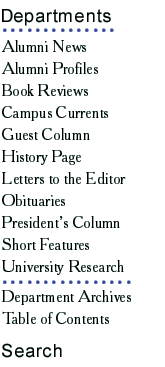

|
 Photo by Philippe Merle 
|
Meet the Man from Interpol
Noble, 45, was born in Fort Dix, N.J., the second son of an African American father and a German mother. Growing up in an interracial, bilingual family in America in the 1960s was not easy. Noble recalls traveling with his family "under cover of darkness to minimize the risk of confrontation." Often, his mother had to stay in a hotel for whites, while the boys and their father stayed in a hotel for blacks. Eventually, James Noble retired from the Army and started a janitorial business near Trenton, N.J. When Noble was in high school, he sometimes worked with his father, cleaning school buildings. "Until I was 16, I just wanted to take over the business," he says. But his father had different ideas. "My father would point to the degrees on the walls of the offices we were cleaning and say, 'Look, as soon as you have one of those, you will have someone like me working for you.' I ended up in college because my father wouldn't accept any other possibility." Noble came to UNH because his brother, James '79, was already a student there and because he received the J. Guy Smart Scholarship. He became an honors student, a founder of the Student Advising Program and director of the New Hampshire State Sikaran Karate Championships. "Being a member of the karate club at UNH taught me discipline, the power of mind over body, more than any other experience in my life," he says of the four years he spent under the tutelage of Sensei George Cartier. "All of it started at UNH," Noble says. "UNH provided me with professors who took an interest in me and my future. I got a strong foundation; the support of the faculty and the students motivated me to do well." After graduating cum laude in 1979, Noble went on to law school at Stanford University, where he was articles editor for the law review and president of his class. His plan after getting his law degree was "to get the best private-sector job I could and make the most money." But despite his accomplishments, Noble found it hard to land a job. One night after work, James Noble drove two hours to Philadelphia, slid his son's resume under Judge Higginbotham's door and rang the doorbell. It was after midnight. "My father didn't say, 'Judge, could you please do me a favor by hiring my son,'" Noble relates. "My father--it makes me want to cry--told the judge, 'I have a son who's going to make your career.'" Higginbotham hired Noble as a law clerk, and through the judge's mentoring, Noble's ambitions began to change. "I was this young lawyer influenced by this giant of a judge," Noble recalls. "He preached to me about the importance of public service. Based on his counseling, his example and his insistence, I decided to become a prosecutor. Once I started doing it, I loved the work. I haven't looked back." After completing his clerkship with Judge Higginbotham in 1984, Noble worked as an assistant U.S. attorney in Philadelphia, where he successfully prosecuted the largest public corruption case in the city's history, as well as a cocaine conspiracy case involving more than 80 defendants. He obtained convictions in every case taken to trial. Then he went to work as a deputy assistant attorney general in the U.S. Justice Department from 1988 to 1989. Noble joined the law faculty at New York University in 1990. He enjoys the academic life, and he is an exceptional teacher. In 1998, he was selected by students and alumni to receive an NYU Great Teacher Award. He says that his model as a teacher is UNH professor of English Lester Fisher. "He taught me to love literature and love writing," Noble recalls. "He was one of the most thoughtful, patient, supportive professors I've ever had." In 1993, Noble took a leave of absence from NYU to serve as assistant secretary of the U.S. Treasury and later as the first under secretary for enforcement. He returned to NYU in 1996, but took another leave of absence in 1999 to begin preparing for his duties at Interpol. "I've never planned very far ahead in terms of the next job," he observes. "My base is my position as a professor of law at NYU. Once I finish my [five-year] term at Interpol, I could be asked to stay on, or I could go back to teaching, which is my great love."--Maggie Paine Return to main Page blog comments powered by Disqus Current issue | Past issues | Class notes Department archives | Send a letter/news | Address updates Advertise | About UNH Magazine | Alumni home | UNH home University of New Hampshire Alumni Association 9 Edgewood Road Durham NH 03824 (603) 862-2040 alumni@unh.edu |